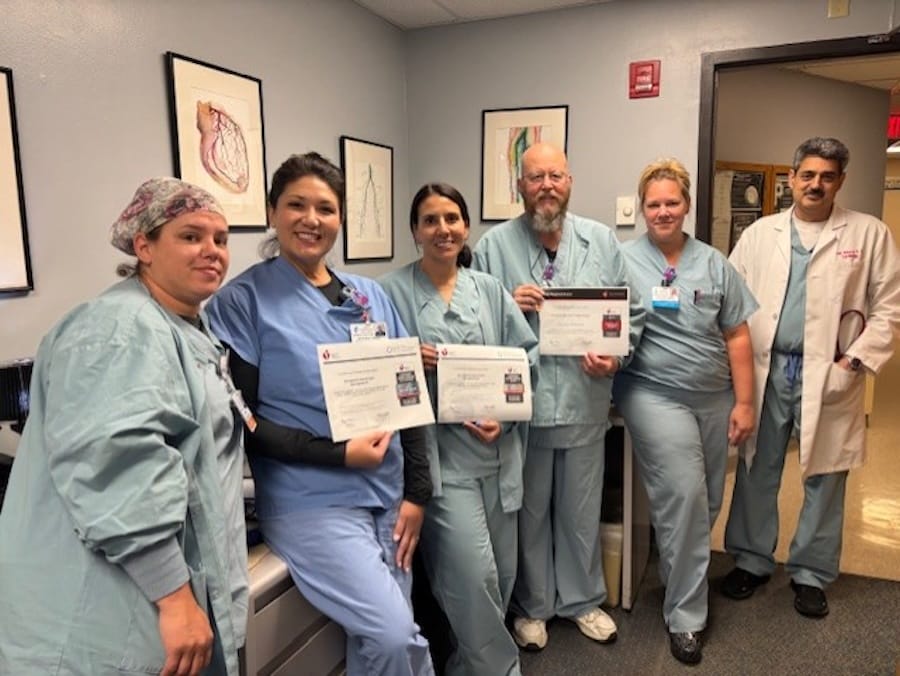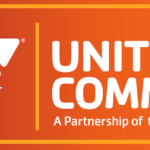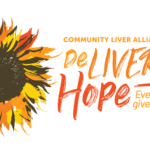Shown displaying the certificates are members of the Penn Highlands Mon Valley Interventional Cardiology Team including (l. to r.) Danielle Yaremko. BSN, RN; Natasha Ousky, MSN, RN, Director of the Cardiac Catheterization Lab and Perianesthesia Services; Carissa Rogers: Lead Cardiac Catheterization Technologist; John Spencer, RN; Phallen Ward, Lead, Interventional Cardiology and Vascular Technologist; and Adil Waheed, DO, Interventional Cardiologist.
Penn Highlands Mon Valley received three American Heart Association (AHA) awards for its commitment to offering rapid, research-based care to people experiencing heart attacks.
Penn Highlands Mon Valley is pleased to be recognized for our achievements in cardiac care,” said Josh LaFleur, Regional Market President — Southwest Region for Penn Highlands Healthcare which includes Penn Highlands Mon Valley. “Our goal is to continue to deliver the best care to each and every heart attack patient in our region.”
Get With the Guidelines – Coronary Artery Disease NSTEMI Gold with Target: Type 2 Diabetes
Nearly 70% of heart attack cases are classified as non-ST elevation myocardial infarction (NSTEMI). The NSTEMI award is earned by hospitals that demonstrate a commitment to treating patients according to the most up-to-date research-based guidelines for NSTEMI care as outlined by the American Heart Association. Penn Highlands Mon Valley also earned the AHA’s Target: Type 2 Diabetes™ Honor Roll award which aims to ensure that patients with Type 2 diabetes, who might be at higher risk for complications, receive the most current, evidence-based care when hospitalized due to heart attack.
“In the event of an NSTEMI heart attack, adherence to the American Heart Association’s guidelines is critical. These guidelines include specific recommendations for in-hospital care and cardiac rehabilitation post-discharge,” said Abhinav Goyal, M.D., MHS, FACC, FAHA, volunteer chair of the American Heart Association Coronary Artery Disease System of Care Advisory Group.
Get With the Guidelines – Coronary Artery Disease STEMI Receiving Center Silver Plus with Target: Type 2 Diabetes
Each year, more than 1 million cases of acute coronary syndrome (ACS) require hospitalization in the United States with approximately 30% classified as ST elevation myocardial infarction (STEMI). This type of heart attack is caused by a complete blockage in a coronary artery. Like all heart attacks, this requires timely treatment to restore blood flow as quickly as possible. STEMI is known to be more severe and dangerous than other types of heart attacks. The STEMI Receiving Center award is earned by hospitals that demonstrate a commitment to treating patients according to the most up-to-date research-based guidelines for STEMI care as outlined by the American Heart Association. This award also included the Type 2 Diabetes Honor Roll Award.
“Effective and timely care is crucial for patients experiencing a STEMI heart attack. The American Heart Association’s guidelines call for specific interventions for these patients both in-hospital and post-hospitalization,” said Dr. Goyal.
Mission Lifeline® Systems of Care Regional Recognition Award
Penn Highlands Mon Valley received the AHA’s Mission Lifeline Systems of Care Regional Recognition Award in acknowledgement for its adherence to the Get With the Guidelines – Coronary Artery Disease performance standards. It recognizes the hospital’s regional collaboration in providing care to those experiencing the most severe heart attacks. This award is earned by hospitals that demonstrate a commitment to work with their referring and receiving hospital partners, as well as EMS, to establish a system of care based on the most up-to-date research-based guidelines as outlined by the American Heart Association
Get With The Guidelines® is the American Heart Association/American Stroke Association’s hospital-based quality improvement program that provides hospitals with the latest research-based guidelines. Developed with the goal of saving lives and hastening recovery, Get With the Guidelines has touched the lives of more than 14 million patients since 2001.
Penn Highlands Healthcare was officially formed in 2011 and is comprised of nine hospitals. Penn Highlands Brookville, Penn Highlands Clearfield, Penn Highlands Connellsville, Penn Highlands DuBois, Penn Highlands Elk, Penn Highlands Huntingdon, Penn Highlands Mon Valley, Penn Highlands Tyrone have served area communities for the past 100+ years. Penn Highlands State College is a new state-of-the-art hospital that opened in 2024. The health system’s business continuum also includes a home care agency, long-term care facilities and residential senior living communities, as well as durable medical equipment companies and retail pharmacies.
Penn Highlands Healthcare has evolved into an organization with approximately 6,200 employees in 150+ locations throughout 26 counties in Pennsylvania that include community medical buildings, outpatient facilities, surgery centers and physician practices. The facilities have a total of 1,396 inpatient, skilled nursing and personal care beds. The system, which has 849 physicians and 427 advanced practice providers on staff, offers a wide range of care and treatments with specialty units for cancer, cardiovascular/thoracic, neurosurgery, pulmonology, neonatal and high-risk pregnancy patients. Being focused on what is important – patients and families – makes Penn Highlands Healthcare a great choice for healthcare in the region.
Throughout the year, our writers feature fresh, in-depth, and relevant information for our audience of 40,000+ healthcare leaders and professionals. As a healthcare business publication, we cover and cherish our relationship with the entire health care industry including administrators, nurses, physicians, physical therapists, pharmacists, and more. We cover a broad spectrum from hospitals to medical offices to outpatient services to eye surgery centers to university settings. We focus on rehabilitation, nursing homes, home care, hospice as well as men’s health, women’s heath, and pediatrics.
Disclaimer: The content on this site is for general informational purposes only and is not intended as medical, legal, or financial advice. No content published here should be construed as a substitute for professional advice, diagnosis, or treatment. Always consult with a qualified healthcare or legal professional regarding your specific needs.
See our full disclaimer for more details.








